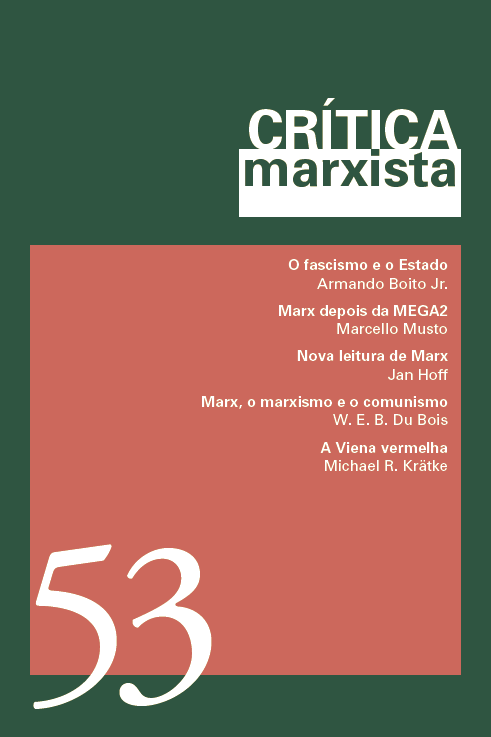Abstract
The Neue Marx-Lektüre (“new reading of Marx”) is a – heterogeneous – tendency within the West German reception of Marx’s critique of political economy, which developed from the 1960s and 1970s on as an alternative to Marxism-Leninism. The main focus of the Neue Marx-Lektüre was (and still is) the reconstruction of Marx’s critique of political economy as a critical theory centered around a specific theory of social forms, value-form theory, theory of fetishism and mystification. However, a minor tendency within the Neue Marx-Lektüre went beyond these topics by asking for the consequences this new reading could have for a Marxist theory of revolution and emancipation. The present article will take this minor tendency within the new reading into account by concentrating on various theoretical approaches formulated mainly by a younger generation of German
Marx-researchers. The aim of the article is to provide the non-German speaking audience with an overview about these theoretical developments that took place in the 2000s and 2010s, in order to provide material for an international dialogue on
Marx and Marxism that would cross national/continental and linguistic barriers.
References
BACKHAUS, H.-G. Dialektik der Wertform. Untersuchungen zur marxschen Ökonomiekritik. Freiburg: Ca Ira, 1997.
BRENTEL, H. Soziale Form und ökonomisches Objekt. Studien zum Gegenstands- und Methodenverständnis der Kritik der politischen Ökonomie. Opladen: Westdeutscher Verlag, 1989.
BRUSCHI, V.; MUZZUPAPPA, A.; NUSS, S.; STÜTZLE, I. Polylux Marx. Bildungsmaterial zur Kapital-Lektüre (Erster Band). Berlin: Dietz, 2012.
CASTORIADIS, C. Vom Sozialismus zur autonomen Gesellschaft: Vom Inhalt des Sozialismus. Lich: AV, 2007.
CHATTOPADHYAY, P. Marx’s Associated Mode of Production. London: Palgrave, 2016.
ELBE, I. Marx im Westen. Die neue Marx-Lektüre in der Bundesrepublik seit 1965. Berlin: Akademie, 2008.
ELBE, I. Umwälzungsmomente der alten Gesellschaft. Revolutionstheorie und ihre Kritik bei Marx. In: KETTNER, Fabian; MENTZ, Paul (Hg.). Theorie als Kritik, Freiburg, 2009, p.93-123.
ELLMERS, S. Die formanalytische Klassentheorie von Karl Marx. Ein Beitrag zur „neuen Marx-Lektüre“. Duisburg: Universitätsverlag Rhein-Ruhr, 2009.
ENGSTER, F. Die Neue Marx-Lektüre, ihr kritischer Gehalt und die nächste Generation. In: ENGSTER, Frank; HOFF, Jan (Hg.). Die Neue Marx-Lektüre im internationalen Kontext (Reihe Philosophische Gespräche 28). Berlin: Helle Panke, 2012, p.29-51.
FÜLBERTH, G. Was kommt nach der Neuen “Kapital”-Lektüre?. Z. Zeitschrift marxistische Erneuerung, 89, 2012, p.136-142.
HAUG, W. F. Zur Kritik der monetaristischen Kapital-Lektüre, Teil II. Das Argument, 258, 2004, p.865-876.
HEINRICH, M. Die Wissenschaft vom Wert. Die Marxsche Kritik der politischen Ökonomie zwischen wissenschaftlicher Revolution und klassischer Tradition. Münster: Westfälisches Dampfboot, 1999.
HEINRICH, M. Kritik der politischen Ökonomie. Eine Einführung. Stuttgart: Schmetterling, 2004.
HEINRICH, M. Welche Klassen und welche Kämpfe? Eine Antwort auf Karl Reitters “Kapitalismus ohne Klassenkampf?”. Grundrisse. Zeitschrift für linke Theorie und Debatte, 11, 2004, p.35-42.
HEINRICH, M. Weltanschauung oder Strategie? Über Dialektik, Materialismus und Kritik in der Kritik der politischen Ökonomie. In: DEMIROVIC, Alex (Hg.). Kritik und Materialität. Münster: Westfälisches Dampfboot, 2008, p.60-72.
HOFF, J. Befreiung heute. Emanzipationstheoretisches Denken und historische Hintergründe. Hamburg: VSA, 2016.
KRÄTKE, M. Geschichte und Theorie des Kapitalismus. Sozialistische Hefte, 11, 2006, p.31-42.
LENIN, W. I. Der “linke Radikalismus”, die Kinderkrankheit im Kommunismus. Berlin/ Ost: Dietz, 1989.
MARX, K. Das Kapital. Kritik der politischen Ökonomie. Bd. 1: Der Produktionsprozess des Kapitals (Marx-Engels-Werke, Bd. 23). Berlin/Ost: Dietz, 1962.
MARX, K. Das Kapital. Kritik der politischen Ökonomie. Bd. 3: Der Gesamtprozess der kapitalistischen Produktion (Marx-Engels-Werke, Bd. 25). Berlin/Ost: Dietz, 1983.
MARX, K. Kritik des Gothaer Programms (Marx-Engels-Werke, Bd. 19). Berlin/Ost: Dietz, 1962, p.13-32.
REITTER; K. Kapitalismus ohne Klassenkampf? Zu Michael Heinrich: „Kritik der politischen Ökonomie“.Grundrisse. Zeitschrift für linke Theorie und Debatte, 11, 2004, p.26-34.
REITTER, K. (Hg.) Karl Marx: Philosoph der Befreiung oder Theoretiker des Kapitals? Wien, 2015.
WALLAT, H. Staat oder Revolution. Aspekte und Probleme linker Bolschewismuskritik. Münster: Edition Assemblage, 2012.
WALLAT, H. Fundamente der Subversion. Über die Grundlagen materialistischer Herrschaftskritik. Münster: Unrast, 2015.

This work is licensed under a Creative Commons Attribution 4.0 International License.
Copyright (c) 2021 Jan Hoff
